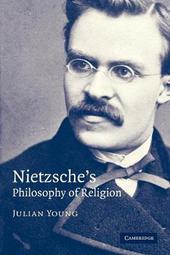
|
Nietzsche's Philosophy of Religion
Paperback / softback
Main Details
| Title |
Nietzsche's Philosophy of Religion
|
| Authors and Contributors |
By (author) Julian Young
|
| Physical Properties |
| Format:Paperback / softback | | Pages:244 | | Dimensions(mm): Height 229,Width 152 |
|
| Category/Genre | Western philosophy - c 1600 to c 1900
Philosophy of religion |
|---|
| ISBN/Barcode |
9780521681049
|
| Classifications | Dewey:210 |
|---|
| Audience | | Professional & Vocational | |
|---|
| Illustrations |
Worked examples or Exercises
|
|
Publishing Details |
| Publisher |
Cambridge University Press
|
| Imprint |
Cambridge University Press
|
| Publication Date |
6 April 2006 |
| Publication Country |
United Kingdom
|
Description
In his first book, The Birth of Tragedy, Nietzsche observes that Greek tragedy gathered people together as a community in the sight of their gods, and argues that modernity can be rescued from 'nihilism' only through the revival of such a festival. This is commonly thought to be a view which did not survive the termination of Nietzsche's early Wagnerianism, but Julian Young argues, on the basis of an examination of all of Nietzsche's published works, that his religious communitarianism in fact persists through all his writings. What follows, it is argued, is that the mature Nietzsche is neither an 'atheist', an 'individualist', nor an 'immoralist': he is a German philosopher belonging to a German tradition of conservative communitarianism - though to claim him as a proto-Nazi is radically mistaken. This important reassessment will be of interest to all Nietzsche scholars and to a wide range of readers in German philosophy.
Author Biography
Julian Young is Professor of Philosophy at the University of Auckland and Honorary Research Professor at the University of Tasmania. His many publications include Heidegger: Off the Beaten Track (2002) edited and translated with Kenneth Haynes, Heidegger's Later Philosophy (2001) and Heidegger's Philosophy of Art (2001, 2004).
Reviews'Julian Young offers a comprehensive, profound, yet consistently lively and engaging overview of Nietzsche's almost obsessive reflections on religion. Young's claim is that instead of rejecting all religion, Nietzsche tries to revive a richer, 'healthier' religious life that existed in earlier times, one that gives us a meaningful way of understanding community, commitment, devotion, the fact of death, and even the 'gods'.' Charles Guignon, University of South Florida 'Every student of Nietzsche in the Anglophone world should read this book.' Nietzsche Circle
|